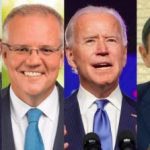IDR Blog
India must articulate a clear stand on Iran
Indian Prime Minister Narendra Modi met Chinese President Xi Jinping on the sidelines of the Shanghai Cooperation Organization (SCO) summit held June 9-10. India’s proposal to host an informal summit in India in 2019, along the lines of the Wuhan summit (in April 2018) was accepted by the Chinese.
Both countries also signed agreements to share hydrological data on the Brahmaputra river and for export of non-Basmati varieties of rice from India. Another issue discussed during the Modi-Xi meeting was collaboration on a joint development project in Afghanistan, first proposed during the Wuhan Summit.
After his meeting with Xi, Modi tweeted, “We had detailed discussions on bilateral and global issues. Our talks will add further vigour to the India-China friendship.”
Speaking of the presence of leaders from India and Pakistan and the entry of both countries into the SCO, Xi said, “The entry of India and Pakistan into the Shanghai Cooperation Organisation would bolster its strength.”
During his address at the SCO plenary Modi referred to two vital issues; connectivity and terrorism.
“We have again reached a stage where physical and digital connectivity is changing the definition of geography. Therefore, connectivity with our neighbourhood and in the SCO region is our priority,” he said.
Modi referred to India’s participation in the Chabahar project and the International North South Transport Corridor (INSTC) as clear instances of India’s firm commitment to connectivity. India, however, refused to endorse the Belt and Road Initiative (BRI) Project, sending a clear message to China that it was not comfortable with Beijing’s initiative.
A declaration issued after the Summit stated that Russia, Pakistan, Kazakhstan, Uzbekistan, Kyrgyzstan and Tajikistan have “reaffirmed their support for the Belt and Road Initiative (BRI)” of China.
In recent months, India’s approach towards both China and USSR has been driven by pragmatism and self-interest. During the Wuhan Summit, as well as during Modi’s visit to Sochi, the changing economic order (especially US president Donald Trump’s isolationist approach) and geo-political developments in South Asia and outside were discussed.
New Delhi’s decision to work on a development project with Beijing in Afghanistan was of special interest. Through both these ‘informal’ summits and New Delhi’s overall attempt to reboot ties with Beijing and Moscow, a clear message would have gone to Washington DC.
India’s stand on the US withdrawal from JCPOA (Joint Comprehensive Plan of Action), and Washington’s continuous threat to impose sanctions against even allies doing business with Iran has been criticized as being muted. Only External Affairs Minister Sushma Swaraj, in a press conference, firmly outlined the status of India’s ties with Iran, saying, “We only recognise UN sanctions. We do not recognise any country-specific sanctions. We don’t make our foreign policy under pressure from other countries. ”
During Iranian Foreign Minister Javad Zarif’s visit to New Delhi (May 28), the possibility of reviving the rupee-rial payment method through the UCO bank was discussed.
During the SCO Summit, while speaking about connectivity projects linked to Iran, Modi did not speak about the relevance of the Iran Nuclear Agreement.
Given India’s economic and strategic interests in Iran (which happens to be the third largest supplier of oil to India), some mention of the Iran Agreement and support for Tehran on the issue would have been appropriate.
India could have used this opportunity to send a tougher message to US on Iran. The timing was apt, given two recent developments.
First, US allies like France, Germany wrote a letter to the US seeking exemption from sanctions. “As allies, we expect that the United States will refrain from taking action to harm Europe’s security interests.”
Both US National Security Advisor John Bolton and US Ambassador to Germany advised European countries to reconsider business ties with Iran. Second, at the G7 Summit, Trump had not really minced any words in the context of tariffs. Trump had accused countries of robbing the US and commented on India saying, “This isn’t just G7. I mean, we have India, where some of the tariffs are 100 per cent. And we charge nothing. We can’t do that.”
While Russian and China’s ties with the US are of a very different nature, both countries seized the opportunity and extended their support to Iran. President Xi, while praising the nuclear agreement, said the deal was “Conducive to safeguarding peace and stability in West Asia and the international non-proliferation regime, and should continue to be implemented earnestly.”
During his meeting with Russian President Vladimir Putin, Iranian President Hassan Rouhani spoke of the need for greater cooperation between both countries after the US withdrawal from JCPOA.
New Delhi needs to use the SCO to its advantage. The organization does provide an opportunity to reach out to China, Russia, Central Asian countries and even Pakistan.
India needs to make its voice heard on the Iran issue and cannot insulate itself. While it is okay not to comment on every geo-political issue, playing it safe on Iran will not benefit New Delhi.
India should have been more categorical in its support for Iran at the SCO Summit, given its interests in that state. Taking a stand similar to China and Russia may not have been possible, because of the Indo-US strategic relationship, but more subtle messaging, that India would follow an independent course, was certainly possible.
Courtesy: https://southasiamonitor.org/news/india-must-articulate-a-clear-stand-on-iran/sl/27449




